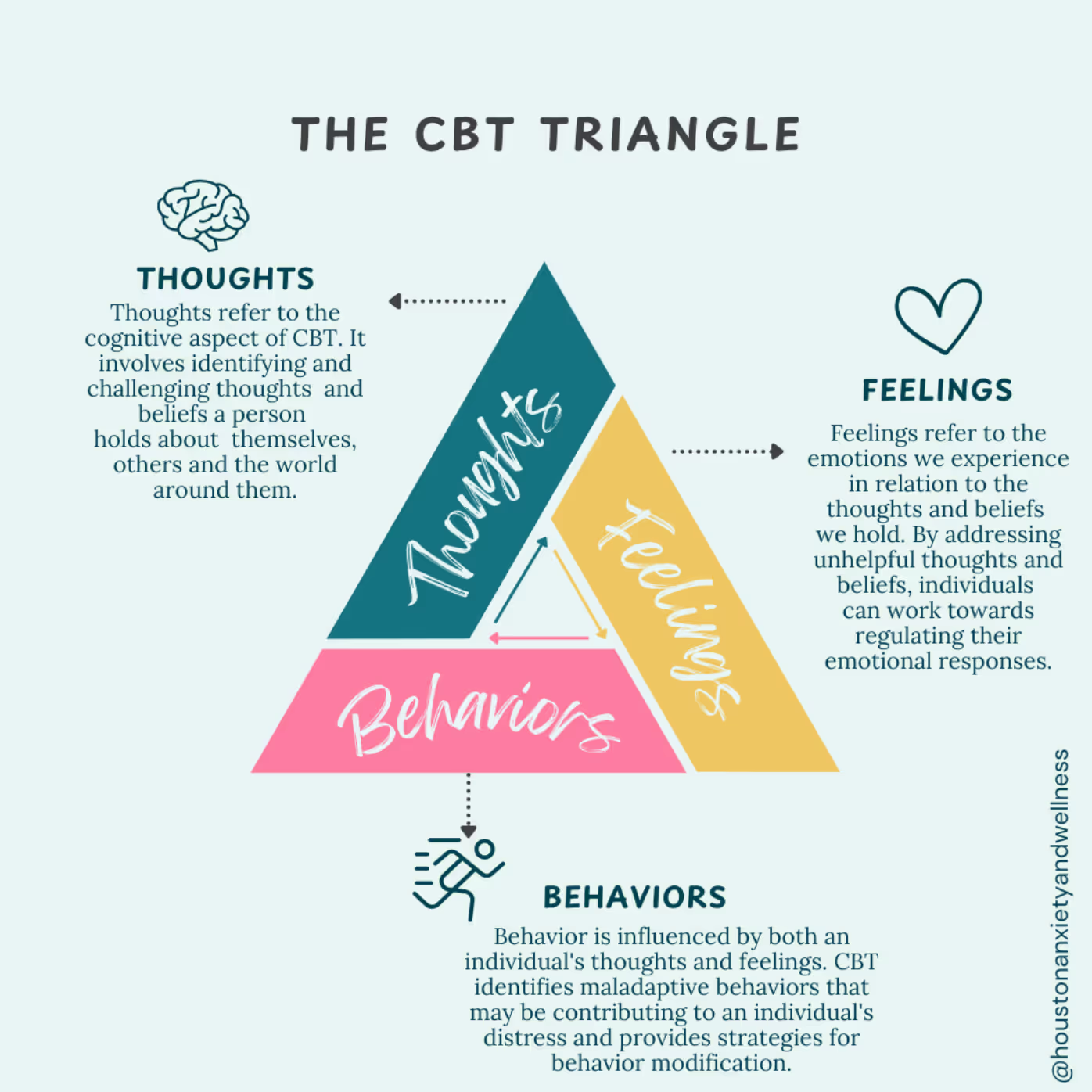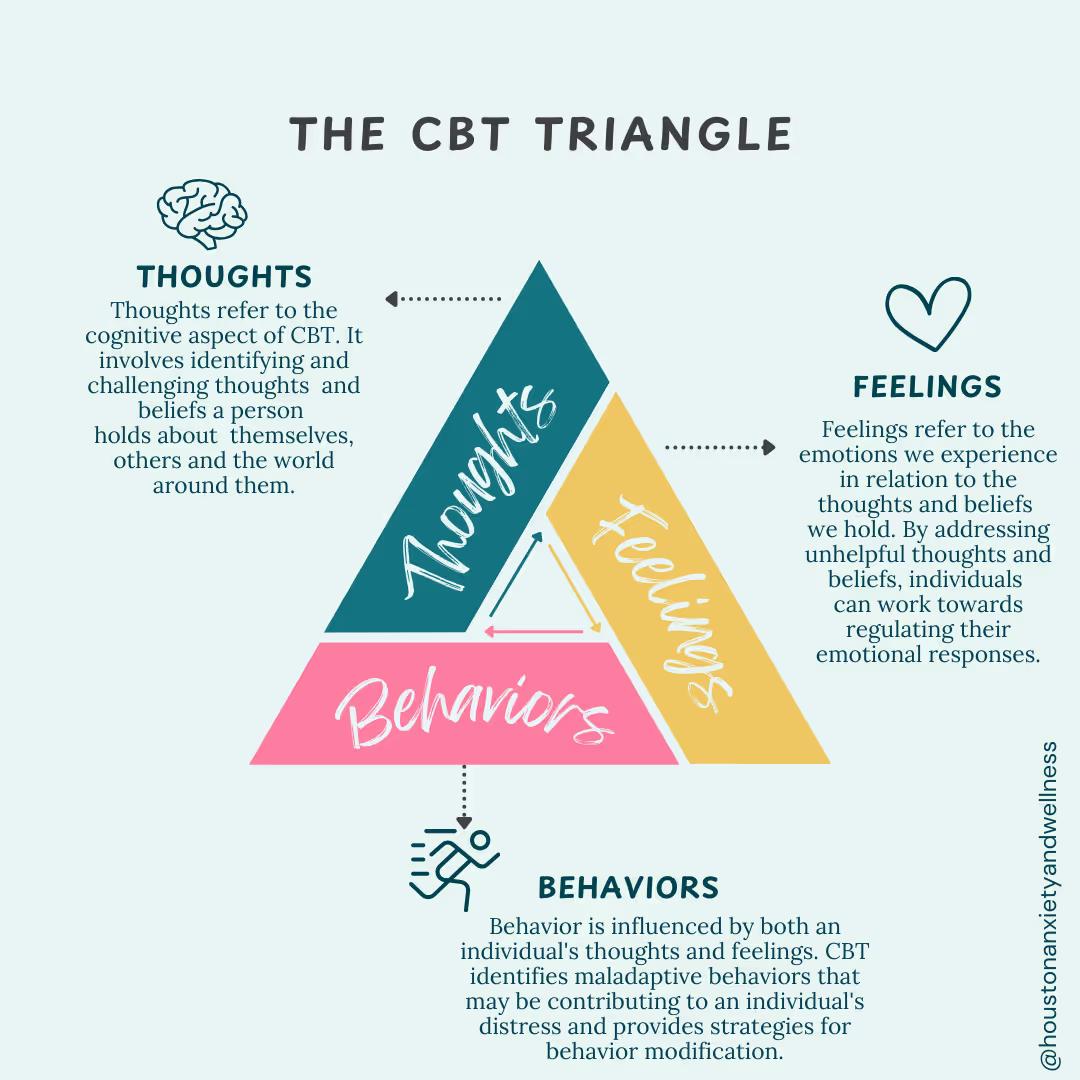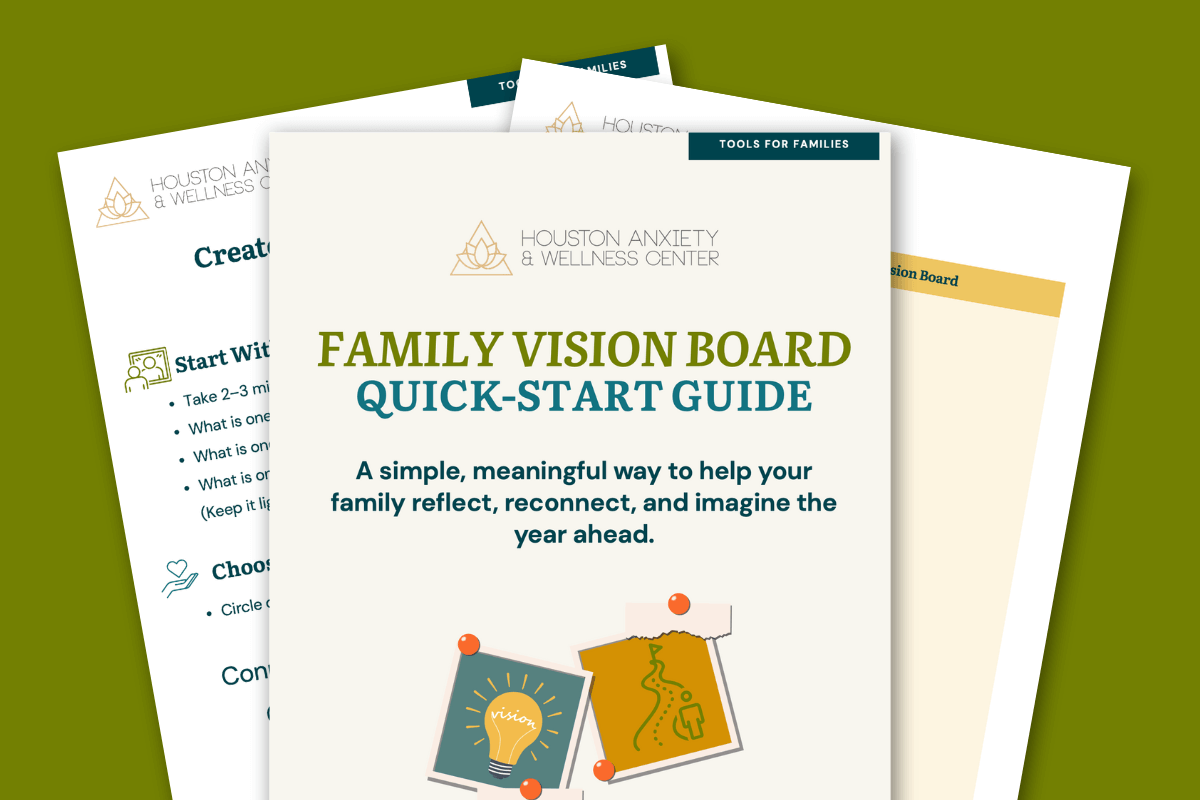
Cognitive Behavioral Therapy (CBT) is based on the idea that our thoughts, feelings, and behaviors are all interconnected.
Our thoughts (or how we perceive or interpret a situation) often affect how we feel about our situation and in turn affect what we do or how our bodies react.

For example, imagine you are getting ready for a big presentation at work or school. You might think, “I am definitely going to mess this up and people are going to think I am incompetent.” As a result you likely feel nervous, a bit worried, anxious, maybe even sad thinking that you are about to blow an opportunity or fail a grade. Your stomach might get queasy, your heart may start to pound, and your mouth might start to feel really dry. You might choose to call in sick to work or school or avoid working on the presentation until the very last minute.
In this example, it’s clear that the thought, “I am going to mess up” has a significant impact → creating feelings of worry and sadness and leading to procrastination, avoidance, and physical symptoms of stress.
What happens in CBT Therapy?
In CBT therapy, your therapist will help you challenge your negative automatic thought that you are “going to mess up” or that others will think of you as “incompetent.” Your CBT therapist will help you first identify your negative thoughts, notice when these types of thoughts pop up, and then use real evidence to help you “fact check” your thoughts. Questions such as “What else could happen?” or “What else could be true?” will help you start to see all the possibilities, instead of just the negative ones. You will learn real life skills to help you become a realistic thinker (not an overly optimistic Pollyanna). We can confidently cope with and work through hard things that are realistic more so than the catastrophic stories we tell ourselves.
Your CBT therapist will also help you to change your behaviors. Instead of avoiding or procrastinating, your therapist will help you break tasks up into smaller pieces, creating a plan to help you feel more comfortable doing the scary thing. For example, maybe you practice your presentation in front of the mirror, then in front of your partner or parent, then maybe you record yourself presenting and re-watch it or share it with a sibling or close friend. The more familiar you become with the discomfort… the less uncomfortable the task. In addition to walking alongside you while you face your fears, your CBT therapist will also help you learn ways to calm and relax your body. You might learn how to properly engage in diaphragmatic breathing, mindfulness, relaxation, and visualizations.
Cognitive Behavioral Therapy is our first line of defense at Houston Anxiety and Wellness Center. Because we believe in individualizing treatment for each person’s unique needs, therapists at our practice also bring in aspects of other modalities to help support our clients. CBT has been proven to be an effective treatment for depression, anxiety disorders, phobias, post-traumatic stress disorder, insomnia, and eating disorders. CBT is also effective for learning new skills for navigating difficult relationships, building self-confidence, and increasing overall contentment, despite circumstances.
Privacy Notice: By providing your email, you understand this resource is educational only and doesn't establish a therapeutic relationship. We use Flodesk (non-HIPAA compliant) to deliver this content and general practice updates. Your email will not be shared with third parties.
Cognitive Behavioral Therapy (CBT) is based on the idea that our thoughts, feelings, and behaviors are all interconnected.
Our thoughts (or how we perceive or interpret a situation) often affect how we feel about our situation and in turn affect what we do or how our bodies react.

For example, imagine you are getting ready for a big presentation at work or school. You might think, “I am definitely going to mess this up and people are going to think I am incompetent.” As a result you likely feel nervous, a bit worried, anxious, maybe even sad thinking that you are about to blow an opportunity or fail a grade. Your stomach might get queasy, your heart may start to pound, and your mouth might start to feel really dry. You might choose to call in sick to work or school or avoid working on the presentation until the very last minute.
In this example, it’s clear that the thought, “I am going to mess up” has a significant impact → creating feelings of worry and sadness and leading to procrastination, avoidance, and physical symptoms of stress.
What happens in CBT Therapy?
In CBT therapy, your therapist will help you challenge your negative automatic thought that you are “going to mess up” or that others will think of you as “incompetent.” Your CBT therapist will help you first identify your negative thoughts, notice when these types of thoughts pop up, and then use real evidence to help you “fact check” your thoughts. Questions such as “What else could happen?” or “What else could be true?” will help you start to see all the possibilities, instead of just the negative ones. You will learn real life skills to help you become a realistic thinker (not an overly optimistic Pollyanna). We can confidently cope with and work through hard things that are realistic more so than the catastrophic stories we tell ourselves.
Your CBT therapist will also help you to change your behaviors. Instead of avoiding or procrastinating, your therapist will help you break tasks up into smaller pieces, creating a plan to help you feel more comfortable doing the scary thing. For example, maybe you practice your presentation in front of the mirror, then in front of your partner or parent, then maybe you record yourself presenting and re-watch it or share it with a sibling or close friend. The more familiar you become with the discomfort… the less uncomfortable the task. In addition to walking alongside you while you face your fears, your CBT therapist will also help you learn ways to calm and relax your body. You might learn how to properly engage in diaphragmatic breathing, mindfulness, relaxation, and visualizations.
Cognitive Behavioral Therapy is our first line of defense at Houston Anxiety and Wellness Center. Because we believe in individualizing treatment for each person’s unique needs, therapists at our practice also bring in aspects of other modalities to help support our clients. CBT has been proven to be an effective treatment for depression, anxiety disorders, phobias, post-traumatic stress disorder, insomnia, and eating disorders. CBT is also effective for learning new skills for navigating difficult relationships, building self-confidence, and increasing overall contentment, despite circumstances.
Recent Posts

Finding Hope in the Mess: A Family Guide to the New Year
Tired of rigid resolutions? Learn the science of hope and use our Family Vision Board Guide to reconnect, regulate, and imagine a meaningful 2026 together.

Create Your Best Year Yet: The Family Vision Board Quick-Start Guide
Reflect, reconnect, and imagine your family's year ahead! Download this simple, meaningful quick-start guide to create your Family Vision Board for 2026.


